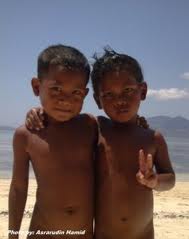sponsored link
Sabtu, 11 Desember 2010
Traveler Ballad Wakatobi
executive summary by Darmansjah
The kids playing a rope swing on the beach in the village of Waha, Wangi-Wangi, Wakatobi, SE Sulawesi, Saturday (30/10). Wakatobi is the center of the world's coral triangle, and was inaugurated as a national park in 1996 with a total area reached 1.39 million hectares.
How comely Wakatobi. However, most people probably did not get to ignore the beauty of the islands. The reason is, all ages, they were busy wandering or "throw away".
Create a population-good Wakatobi Bajo tribe, Buton, and Ciacia-wandering is obligatory episode in their life's journey. "If you do not wander, we're embarrassed, had no story," said Sahrudin (34), citizen Wakatobi (short-Wangi Wangi, Kaledupa, Tomia, Binongko), Southeast Sulawesi.
When the age of seven years in 1983, young people from Buton tribe has invited his mother to wander to Tanjung Pinang, Riau Islands. They followed his father who went wandering since Sahrudin birth. "It was the first time I met you," he said.
Not long lived together, she left her mother, who worked at the plywood mill. While his father migrated to Singapore. Sahrudin also must live with its neighbors. After three years, he was brought home to her grandmother's house in Tomia. Father-mother to wander again and Sahrudin not always know where they are located.
"We just send word through a neighbors who happened to wander. The news will be forwarded a chain. Sometimes, after six months, until new news. Understandably, there is no cell phone first, "he said.
When aged 20 years, Sahrudin start his own travels. "We call it 'throw away', surrender to fate. Later in overseas so employers, unions, or villains, it's up to it. "
Pirate ship
And, it turns out Sahrudin colorful odyssey. She had worked at the garage while continuing school in Kendall, a guard house in Jakarta, and a tin miners. He then returned in 2003 and lived quietly in Tomia until now. During the wanderings, he had met people in the same island with various professions, from laborers to pirates.
Sadar Acts (30) no less colorful. He was born in sope-sope (house boat) when his father Sakai (wander) in the middle of the ocean. "Since then I live on a boat and learn to live from the ocean," says Sadar, child Bajo tribe or tribal marine who now live in settlements in Mola Bajo, Wangi-Wangi.
When Sadar was seven years old, his father encouraged him to wander to see the world. He was entrusted to a carrier vessel crops. There, he got a role as a cook and waiter skipper. For a year joined the ship, he saw Poso, Manado, Maluku, Tanjung Pinang, Malaysia, Singapore, and Brunei.
After a year, Sadar was coming back. At that time, his father asked, "What you see in the odyssey?"
Sadar tell what he saw, including all the barriers during the odyssey. "I said, 'I do not understand the navigation of nature'," he said.
That same day his father brought Sadar into the sea. She taught him to understand the weather, reading the constellations, weather, wind, and recognize the ocean currents. "That's the Bajo people teach their children understand the world. All science is derived with the language says, "Sadar said.
Since the age of 13 years, he wandered the land for years. He is looking for science in school to be able to achieve a Bachelor Degree in English from the University of Hasanuddin. Now, a researcher Conscious Bajo tribe, his tribe itself.
In the living Husbands
This nomadic tradition gave birth to another story that is no less interesting. One was about the fate of women in the village who left her husband "throw away".
In Kulati, Tomia Island, who inhabited the people of Buton, there Wa Jania (40) who has 10 years of wandering husbands. "Since he left, no one had ever heard. Maybe she was married again, "he said irritably.
Wa Jania had to raise four children alone in a house with dirt floors, walls neighbors loan board. For family meals, she relies on cassava gardens and meti (tidal areas) where the octopus, clams, and sea urchins are found.
Women Wa Jania same boat easily found in Tomia. Aminudin (42), residents Kulati, say, around the house there are 10 women who left their husbands. "There are already 20 years left and his children did not know his father's face."
Perhaps, this is the bitter tale of nomadic tradition though, said Sahrudin, this matter is considered plural and is part of life's journey nomadic tribal families.
"Although the parents left to go abroad, our relations remain close," he said.
Bajo people, Buton, and Ciacia is a portrait of ordinary people are resilient in the face of the hard life without complaining.
For further informatin related journey , please visited my other articles on "info-wisata"
Langganan:
Posting Komentar (Atom)





Tidak ada komentar:
Posting Komentar